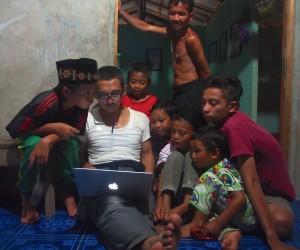School-aged children are surrounded by messages about food and nutrition, from shop signs to brand advertising. Linguists from Indonesia and Australia have developed a new way of studying how this affects them, using smartphones and clever analysis.
In a project financed by The Australia-Indonesia Centre and led by Dr Sisilia Halimi of Universitas Indonesia and Professor Lesley Harbon of the University of Technology Sydney, researchers used their phones to take pictures of the ‘linguistic landscape’ around schools and their surrounds, in fact anywhere written text was evident.










